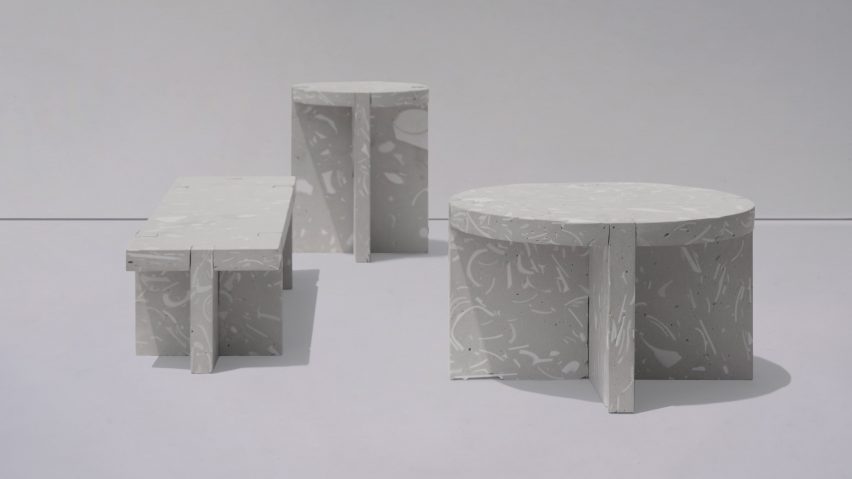Chinese studio Bentu Design aims to highlight the amount of waste produced by the ceramics industry with its Wreck furniture range.
The collection includes side tables, lamp shades and benches, made from a mix of ceramic shards and concrete. Rather than crush the ceramic completely, the shards are visible in the surface of the final products.
To make the furniture, the concrete and ceramic mix is cast into moulds and left to set. A subtle colour is applied to compliment the visible fragments of bowls, cups and even Buddha statues that are visible in the pieces.
The studio, which was founded in 2011, conducted an in-depth investigation into the amount of waste created by the ceramic industry in the town of Chaozhou in eastern China.
Chaozhou is the biggest ceramics production base in the world and creates around 70 per cent of the daily-use ceramic commodities used globally.
Bentu noticed that globalisation, and an increased demand for ceramic pieces, had driven a wave of new factories in Chaozhou. Although this growing demand creates jobs and opportunity, it also accelerates the amount of waste produced.
Recycling plants are now replacing some of the city's factories, dealing with ceramic waste not only from China, but from all over the world. The majority becomes mountains of unusable fragments, some of which Bentu has repurposed.
Bentu hopes that by creating its furniture from this discarded material, it can highlight the value that can be found in this waste.
"Our name Bentu means 'local creating'. It means starting from an understanding and raw materials that are local. Even dirt could be as valuable as diamond when it is treated diligently," said the studio to Dezeen.
The studio chose to make pieces that are widely used in our daily lives — like lamps and furniture. The designers hope that this will help people relate to the pieces more easily and become curious about the material itself.
Bentu have also experimented with other materials, including concrete, terrazzo, old industrial pipes, soil and even yak dung.
"We always pay close attention to the ordinary and useless material like construction waste, pipes and even the excrement of cows. It is not surprising that we now turn our hands to ceramic waste," said the studio.
"Making degradable and pollution-free yak dung into household furniture is an attempt to save resources, reduce energy consumption and introduce material recycling to our daily life. We have even tried to regenerate other materials, such as ash from animal bones and straw," continued Bentu Design.
In a previous collection called Ceramics Made that included shelving and tables, Bentu used old tiles to create a terrazzo-style texture. The tiles for their terrazzo were sourced from China's Foshan city, another of the country's industrial hubs.

